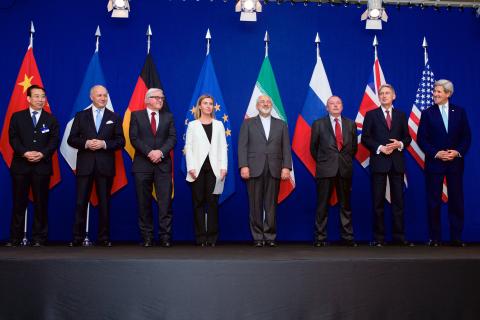
On October 13, President Trump decided not to recertify the two-year-old nuclear deal with Iran, an important diplomatic agreement to curtail Iran’s nuclear program. The president has called the deal “unacceptable” and “an embarrassment” despite assurances by the International Atomic Energy Agency that Iran is in compliance with the agreement.
Now it is up to Congress to decide if the United States should remain in the deal. Congress has 60 days to act on whether to restore economic sanctions, take other actions against Iran, or do nothing.
Take action: Tell Congress that the United States should remain in the Iran nuclear deal.
After years of tense and delicate negotiations, the signatories (the five permanent members of the United Nations Security Council – China, France, Russia, United Kingdom, United States – plus Germany and the European Union) agreed with Iran that:
- Iran’s uranium stockpiles will be considerably reduced;
- Various uranium enrichment activities either will be stopped or greatly limited;
- The International Atomic Energy Agency will have regular access to its nuclear facilities.
In return, the crippling economic sanctions against Iran have been lifted.
The Iran nuclear deal makes all of us safer. It is a critical step toward nuclear non-proliferation and, ultimately, nuclear abolition. It is a concrete example of the value of international cooperation and skilled diplomacy in preventing war and stopping the spread of nuclear weapons.
Spread the message on social media
More than 750 Catholic leaders signed a letter to President Trump and Congress in support of diplomatic efforts to defuse rising tensions over nuclear weapons not only with Iran but also North Korea. Click HERE to join the “thunderclap”on November 1. By adding your name, a message about this call for diplomacy will be automatically posted on your social media accounts on November 1.
Thank you.
Photo: The ministers of foreign affairs and other officials from the P5+1 countries, the European Union and Iran while announcing the framework of a Comprehensive agreement on the Iranian nuclear programme. Hailong Wu of China, Laurent Fabius of France, Frank-Walter Steinmeier of Germany, Federica Mogherini of the European Union, Javad Zarif of Iran, an unidentified official of Russia, Philip Hammond of the United Kingdom and John Kerry of the United States in the "Forum Rolex" auditorium of the EPFL Learning Centre, Écublens-Lausanne, Switzerland on April 2, 2015. Photo by U.S. Department of State and available online in the public domain.
